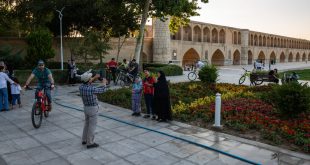JOHANNESBURG, Apr 19 (IPS) – Matiullah Wesa’s crime was to try to ensure young people got an education in Afghanistan. His recent forceful abduction by the Taliban offers the latest stark reminder that global solidarity and coherent action from the international community are needed to prevent the complete loss of the rights of women and girls in Afghanistan.
Matiullah has been at the forefront of advocating for access to education as a co-founder and leader of Pen Path. For more than a decade, Pen Path has worked with community and tribal leaders in remote areas in Afghanistan to advocate for education and bring learning closer to communities. It works to enlighten communities about the importance of education, particularly girl’s and women’s education, organises book donations, runs mobile libraries in remote areas and reopens schools closed by years of conflict and insecurity. Pen Path has reopened over 100 schools, distributed more than 1.5 million items of stationery and provided education facilities for 110,000 children – 66,000 of them girls. This is what Matiullah is being punished for.
The abduction of Matiullah and many others advocating for the rights of education point to a concerted effort by the Taliban to try to restrict women’s and girls’ access to education and silence those advocating for education and an inclusive society.
There are sadly many other instances. In November 2022 around 60 Taliban members stormed a press conference organised to announce the formation of Afghan Women Movement for Equality. They arrested conference participants and deleted all images from their phones.
Immediately after taking power in August 2021, the Taliban instructed women to stay at home and avoid travelling. In December 2022, the Ministry of Higher Education announced it had suspended university education for women until further notice. Taliban officials argued that female students did not wear proper clothing on campus and announced it was enforcing gender segregation in schools. These decisions have been accompanied by others that force thousands of female workers to stay at home and prevent women and girls entering public spaces such as parks.
In December 2022 the Taliban banned women from working for international and national civil society organisations. This was a move that could only be counter-productive, since women play a vital role in providing essential services that people need. Banning women from working for civil society organisations affects millions in dire need of humanitarian assistance and services to women and children, as well as further increasing unemployment. The Taliban urged organisations to suspend female staff under the pretence that workers did not adhere to the regime’s strict dress code.
Most recently, women have been banned from working for United Nations agencies that are operating in Afghanistan. The United Nations may have to pull out.
It has taken just months for the Taliban to reverse the gains made over the years before their return that saw Afghan women claim visibility in public life and work such roles as broadcasters, doctors and judges.
Women in Afghanistan are fighting but can’t succeed alone
These restrictions on women’s rights should be seen in the context of the closing of civic space and attacks on other fundamental rights. As a result, Afghanistan’s civic space rating was recently downgraded to closed, the worst category, by the CIVICUS Monitor, a research partnership that tracks civic space conditions in 197 countries.
Despite the ongoing restrictions against women, the brave women of Afghanistan refuse to back down. They continue to organise what protests they can against restrictions and women human rights defenders continue to advocate for the rights of all women and girls to access education and participate in decision-making processes.
When women protest against restrictions, they risk harassment, physical and psychological torture and detentions. Some have been forcefully abducted from their homes. In January 2022, Taliban gunmen raided the homes of women human rights defenders Parwana Ibrahimkhel and Tamana Zaryab and abducted them.
No society can reach its real potential without the participation of women. The international community must double its efforts to support women and girls in Afghanistan. States should respond proactively to the United Nations 2023 appeal for Afghanistan. Aid should however be made conditional on guarantees to uphold the fundamental rights of women and girls. The international community should accompany aid with a strategy to build a more inclusive and open society.
Not to do so would be to abandon the likes of Matiullah Wesa, the many others like him penalised for standing up for education and rights, and the women of girls of Afghanistan being forced into silence.
David Kode is the Advocacy and Campaigns Lead at CIVICUS, the global civil society alliance.
Follow @IPSNewsUNBureau
Follow IPS News UN Bureau on Instagram
© Inter Press Service (2023) — All Rights ReservedOriginal source: Inter Press Service
 Top Naija News: Nigerian News, Breaking News Nigeria and World News Top Naija News is a daily news publication in Nigeria, delivering the latest breaking news in Nigeria and around the world.
Top Naija News: Nigerian News, Breaking News Nigeria and World News Top Naija News is a daily news publication in Nigeria, delivering the latest breaking news in Nigeria and around the world.




